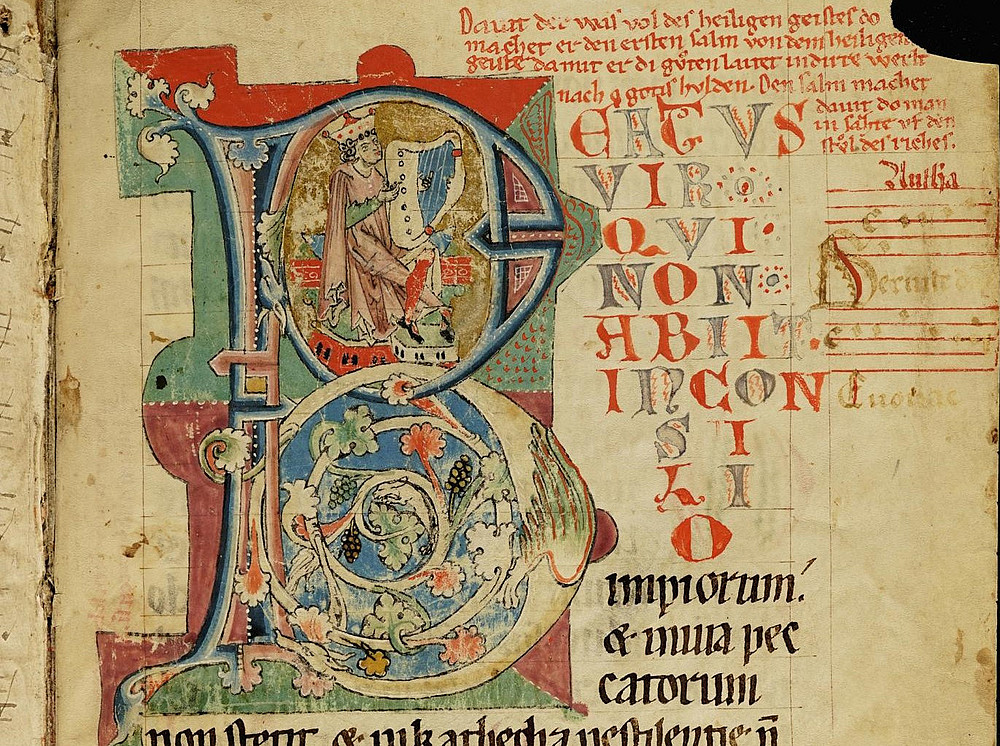The Dark Ages?
The German Medieval Studies Division introduces itself
As a branch of German Studies, German Medieval Studies is concerned in research and teaching with the German textual tradition of the Middle Ages, i.e. with language and literature from the beginnings of vernacular writing in the 8th century to the first transitions to a modern language and literature system in the course of the 16th century.
The linguistic history section deals with the various language stages of German in its historical and regional development, from Old High German to Middle High German and Early Modern High German. In order to convey the prerequisites for understanding this, which in particular serve the acquisition of translation skills from Old and Middle High German into Modern High German, the focus is not only on the phonetics and form theory of the older German language stages, but also on older languages themselves (Indo-European, Gothic, Old Norse, etc.) as well as questions of historical semantics.

The literary studies section of German Medieval Studies focuses on the literary constitution of the surviving texts from the older language periods. This must, of course, be based on a broader concept of literature, as medieval studies is not only concerned with genuinely 'literary' texts, but also with forms of pragmatic writing (understood in the broadest sense), with texts of everyday use such as legal writings, medical remedies and recipes, but also with visionary literature, sermons or spiritual treatises, with spells or travelogues.
In addition to the usual questions of literary studies - such as those concerning narrative forms, genres, narratological or text-critical possibilities of description and representation, narrative schemes or rhetorical and stylistic devices - it is also essential to consider the surviving texts in their cultural, medial, political and social context. A profound understanding of medieval literature requires not only the tools of philological expertise, but also a willingness to work in a comparative and interdisciplinary manner in order to be able to view this literature in its discursive and cultural-historical interconnectedness. In German Medieval Studies, literary studies are therefore always conducted in the context of a cultural-scientific, pan-European context and its significance within an interdisciplinary debate.
-
Documentary (ORF): "Heritage Austria. Prostitution under the double eagle", contributions by Ao.Univ.-Prof. Mag. Dr.phil. Brigitte Spreitzer-Fleck
- Recontextualizing Medieval Heritage and Identity in Contemporary Austria.
Series: Places and Spaces, Medieval to Modern, Alexandra Sterling-Hellenbrand (Gastprofessorin), ARC Humanities Press, 2024. - Mîn sanc sol wessen dîn. Deutsche Lyrik des Mittelalters und der frühen Neuzeit: Interpretationen. Hg. von Holger Runow, Tobias Bulang und Julia Zimmermann, Wiesbaden 2023.
- Wege der Germanistik in transkultureller Perspektive.
Akten des XIV. Kongresses der Internationalen Vereinigung für Germanistik (Jahrbuch für Internationale Germanistik, Beihefte), Bd. 7, Sektion B 15: Konstruktionen des Orients in der deutschsprachigen Literatur des Mittelalters, hg. von Julia Zimmermann, Claudia Händl, und Beate Kellner. Bern 2022.
Of the approximately 1100 codices and countless manuscript fragments from the Middle Ages held in the special collections of Graz University Library, around 160 are partly or entirely in German. The aim of the "Object of the Month" project is to prepare and present exemplary "highlights" not only from this collection, but also from Latin manuscripts, among others. The individual articles were mainly created as project work by the participants of the course "Historical Media: Medieval Manuscripts" at the Institute of German Studies in close cooperation with the special collections of Graz University Library.